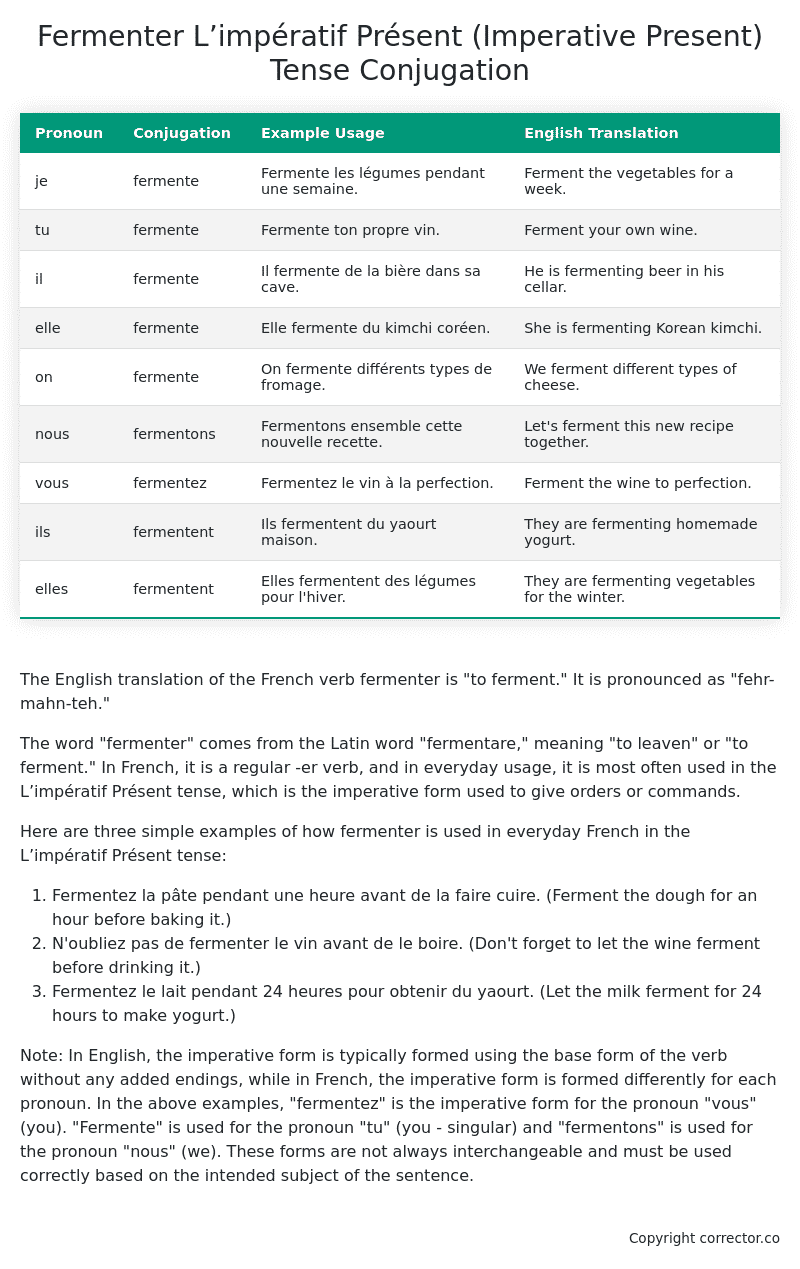L’impératif Présent (Imperative Present) Tense Conjugation of the French Verb fermenter
Introduction to the verb fermenter
The English translation of the French verb fermenter is “to ferment.” It is pronounced as “fehr-mahn-teh.”
The word “fermenter” comes from the Latin word “fermentare,” meaning “to leaven” or “to ferment.” In French, it is a regular -er verb, and in everyday usage, it is most often used in the L’impératif Présent tense, which is the imperative form used to give orders or commands.
Here are three simple examples of how fermenter is used in everyday French in the L’impératif Présent tense:
- Fermentez la pâte pendant une heure avant de la faire cuire. (Ferment the dough for an hour before baking it.)
- N’oubliez pas de fermenter le vin avant de le boire. (Don’t forget to let the wine ferment before drinking it.)
- Fermentez le lait pendant 24 heures pour obtenir du yaourt. (Let the milk ferment for 24 hours to make yogurt.)
Note: In English, the imperative form is typically formed using the base form of the verb without any added endings, while in French, the imperative form is formed differently for each pronoun. In the above examples, “fermentez” is the imperative form for the pronoun “vous” (you). “Fermente” is used for the pronoun “tu” (you – singular) and “fermentons” is used for the pronoun “nous” (we). These forms are not always interchangeable and must be used correctly based on the intended subject of the sentence.
Table of the L’impératif Présent (Imperative Present) Tense Conjugation of fermenter
| Pronoun | Conjugation | Example Usage | English Translation |
|---|---|---|---|
| je | fermente | Fermente les légumes pendant une semaine. | Ferment the vegetables for a week. |
| tu | fermente | Fermente ton propre vin. | Ferment your own wine. |
| il | fermente | Il fermente de la bière dans sa cave. | He is fermenting beer in his cellar. |
| elle | fermente | Elle fermente du kimchi coréen. | She is fermenting Korean kimchi. |
| on | fermente | On fermente différents types de fromage. | We ferment different types of cheese. |
| nous | fermentons | Fermentons ensemble cette nouvelle recette. | Let’s ferment this new recipe together. |
| vous | fermentez | Fermentez le vin à la perfection. | Ferment the wine to perfection. |
| ils | fermentent | Ils fermentent du yaourt maison. | They are fermenting homemade yogurt. |
| elles | fermentent | Elles fermentent des légumes pour l’hiver. | They are fermenting vegetables for the winter. |
Other Conjugations for Fermenter.
Le Present (Present Tense) Conjugation of the French Verb fermenter
Imparfait (Imperfect) Tense Conjugation of the French Verb fermenter
Passé Simple (Simple Past) Tense Conjugation of the French Verb fermenter
Passé Composé (Present Perfect) Tense Conjugation of the French Verb fermenter
Futur Simple (Simple Future) Tense Conjugation of the French Verb fermenter
Futur Proche (Near Future) Tense Conjugation of the French Verb fermenter
Plus-que-parfait (Pluperfect) Tense Conjugation of the French Verb fermenter
Passé Antérieur (Past Anterior) Tense Conjugation of the French Verb fermenter
Futur Antérieur (Future Anterior) Tense Conjugation of the French Verb fermenter
Subjonctif Présent (Subjunctive Present) Tense Conjugation of the French Verb fermenter
Subjonctif Passé (Subjunctive Past) Tense Conjugation of the French Verb fermenter
Subjonctif Imparfait (Subjunctive Imperfect) Tense Conjugation of the French Verb fermenter
Subjonctif Plus-que-parfait (Subjunctive Pluperfect) Tense Conjugation of the French Verb fermenter
Conditionnel Présent (Conditional Present) Tense Conjugation of the French Verb fermenter
Conditionnel Passé (Conditional Past) Tense Conjugation of the French Verb fermenter
L’impératif Présent (Imperative Present) Tense Conjugation of the French Verb fermenter (this article)
L’infinitif Présent (Infinitive Present) Tense Conjugation of the French Verb fermenter
Struggling with French verbs or the language in general? Why not use our free French Grammar Checker – no registration required!
Get a FREE Download Study Sheet of this Conjugation 🔥
Simply right click the image below, click “save image” and get your free reference for the fermenter L’impératif Présent tense conjugation!

Fermenter – About the French L’impératif Présent (Imperative Present) Tense
Usage
Giving commands
Making requests
Offering advice
Expressing desires
Conjugation Formation
Interactions with other tenses
Want More?
I hope you enjoyed this article on the verb fermenter. Still in a learning mood? Check out another TOTALLY random French verb conjugation!


